
- Home
- India
- World
- Premium
- THE FEDERAL SPECIAL
- Analysis
- States
- Perspective
- Videos
- Sports
- Education
- Entertainment
- Elections
- Features
- Health
- Business
- Series
- In memoriam: Sheikh Mujibur Rahman
- Bishnoi's Men
- NEET TANGLE
- Economy Series
- Earth Day
- Kashmir’s Frozen Turbulence
- India@75
- The legend of Ramjanmabhoomi
- Liberalisation@30
- How to tame a dragon
- Celebrating biodiversity
- Farm Matters
- 50 days of solitude
- Bringing Migrants Home
- Budget 2020
- Jharkhand Votes
- The Federal Investigates
- The Federal Impact
- Vanishing Sand
- Gandhi @ 150
- Andhra Today
- Field report
- Operation Gulmarg
- Pandemic @1 Mn in India
- The Federal Year-End
- The Zero Year
- Science
- Brand studio
- Newsletter
- Elections 2024
- Events
- Home
- IndiaIndia
- World
- Analysis
- StatesStates
- PerspectivePerspective
- VideosVideos
- Sports
- Education
- Entertainment
- ElectionsElections
- Features
- Health
- BusinessBusiness
- Premium
- Loading...
Premium - Events
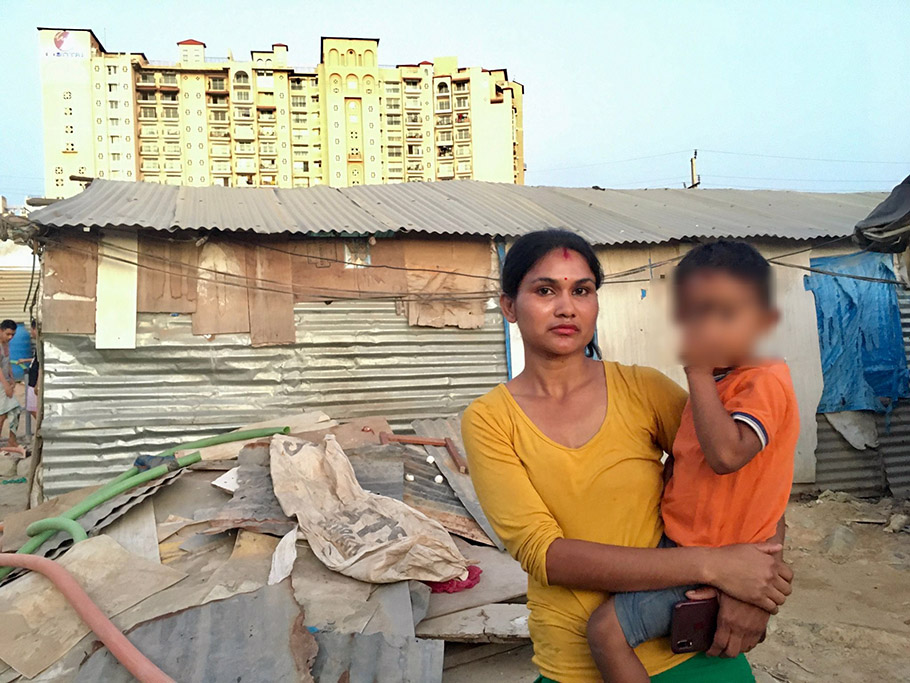
Slum dwellers worry job loss, price rise will break their backs before COVID-19 gets them
Government will have to generate employment like beedi rolling, incense stick manufacturing, tailoring, among others to keep the informal settlers engaged, according to experts.

Roads leading to Bengaluru’s tech parks are empty. The offices that employed thousands look deserted, except for some security staff. There’s a deafening silence in malls and commercial establishments. Everything is shut due to the 21-day lockdown announced by Prime minister Narendra Modi to prevent the spread of coronavirus. It has brought Bengaluru’s booming IT corridor to...
Roads leading to Bengaluru’s tech parks are empty. The offices that employed thousands look deserted, except for some security staff. There’s a deafening silence in malls and commercial establishments.
Everything is shut due to the 21-day lockdown announced by Prime minister Narendra Modi to prevent the spread of coronavirus. It has brought Bengaluru’s booming IT corridor to a standstill.
But a little away, inside the streets between the main road, the informal settlements in Kariyammana Agrahara present a contrasting scene. Life is bustling with activity here. Petty shops are crowded with people picking up daily essentials. Labourers, housekeeping workers, drivers, and maids who are either laid off or granted leave due to the lockdown, are chatting outside their makeshift tin houses with no electricity. Women are scrambling to get water in pots. Kids are playing with their wooden toys around heaps of garbage. And a few men are standing outside a small shop watching television placed inside a shop.
Anyone you speak with here has two concerns — will this shutdown result in job loss and when they can afford the next decent meal. Essentially, the threat of job security and the poverty is lurking in their minds and is strikingly obvious on their face.
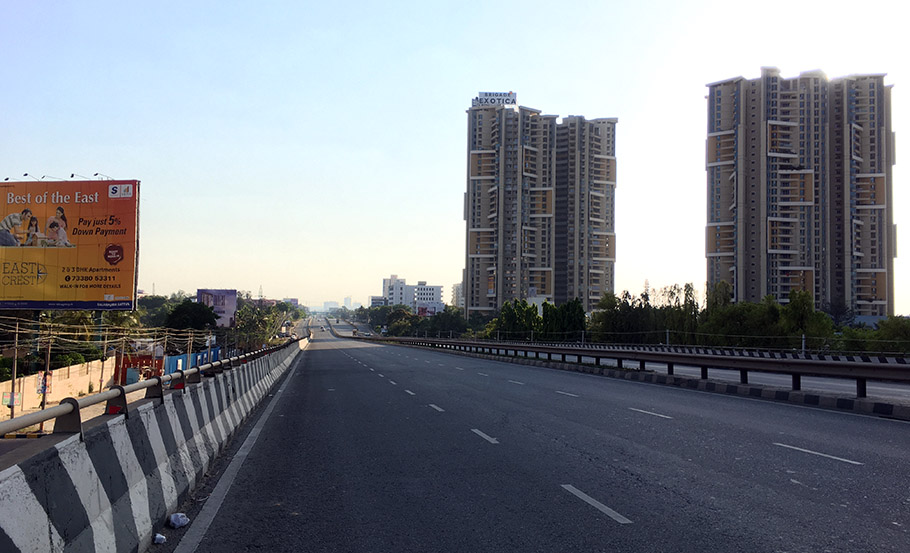
Beyond the healthcare scare, the coronavirus outbreak and the subsequent lockdown is threatening the livelihood of millions of people in such informal settlements and slums across the country as they cannot afford the luxury of working from home.
Even as Union Information and Broadcasting Minister Prakash Javadekar was busy posing for a photo of himself watching Ramayana on TV amidst the lockdown and posting it on social media platforms, Abdul Kalam Khan, a migrant worker from Delhi settled in the informal settlement in Kariyammana Agrahara, Bengaluru, skipped his breakfast and was thinking how he would cope.
With the prices of vegetables nearly doubling, he and his family of five can no longer afford three meals a day. They were just recovering from the damages caused to their shanties after a civic body official illegally ordered to raze down their huts in January this year. The officer, who was later suspended for his act, had doubted them as illegal Bangladeshi immigrants and hence ordered the demolition. With finances drying up, the only thought in their minds is when the train/bus services would resume. For, they wish to return to their hometowns if the situation turns worse and results in them losing jobs.
Khan, 24, who worked as a driver in a private firm, says the job scenario is frozen since March 21. He’s not sure if his employer would pay for the shutdown days although government has asked that salaries be paid. And he’s not even sure if the payment would come in the first week of April.
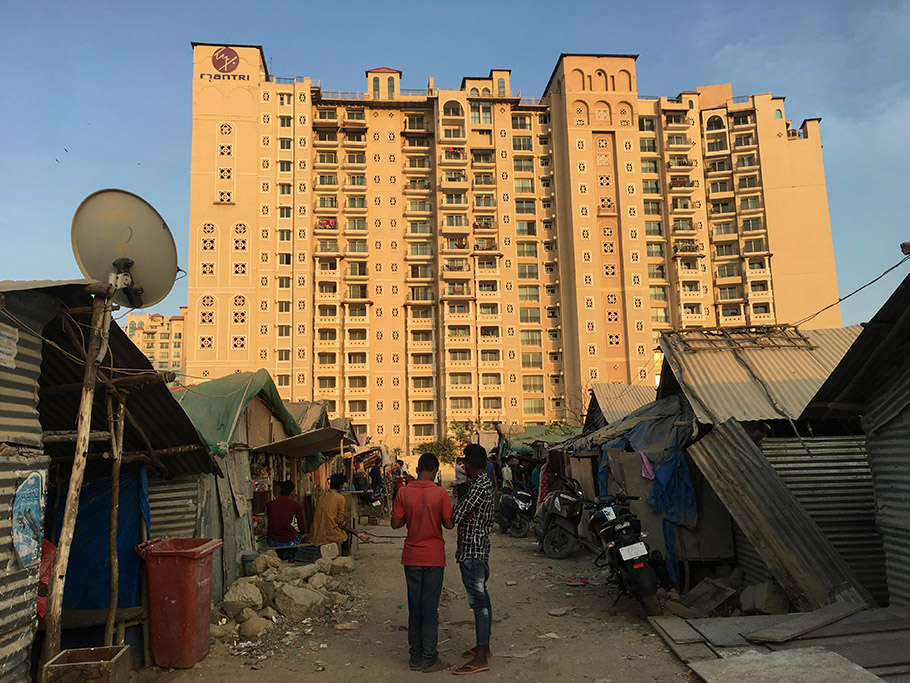
Since he’s a contract employee, he fears that an extended lockdown will affect him further. Living in a 100-150 sqft of tent house, he says his family cannot afford to pay ₹3,000 rent if the lockdown continues for another 10 days. All their ration cards are in Delhi and they cannot get the essentials at subsidised rates in Bengaluru, which forces them to shell out more at the nearby retail shop.
“Instead of eating thrice a day, we now eat once or twice with reduced quantity. Many like us go hungry in the settlement,” Khan says, adding that NGOs and municipal corporation workers do bring food packets to the settlement, but only a limited quantity. “Only about a tenth of the residents might get them.”
Khan wanted to travel back to Delhi soon after Prime Minister announced the lockdown. But with public transport services halted, he was left with no option. His uncle, in his 50s, says if the services do not resume after April 15, he has no choice but to go to Delhi by walk, like the thousands of migrant workers across the country who walked hundreds of kilometres to their hometowns and villages in the wake of the nation-wide lockdown and suspension of transport services.
“The central government should have planned the shutdown a week in advance and let these people travel back home if they wanted to. Nobody wants to die in an unknown land away from family. But they failed,” says Dr V Deepa Nair, professor at the Centre for Urban Development studies at Dr MCR Human Resources Development Institute. “The mass exodus is a result of fear factor that the respective governments failed to address.”
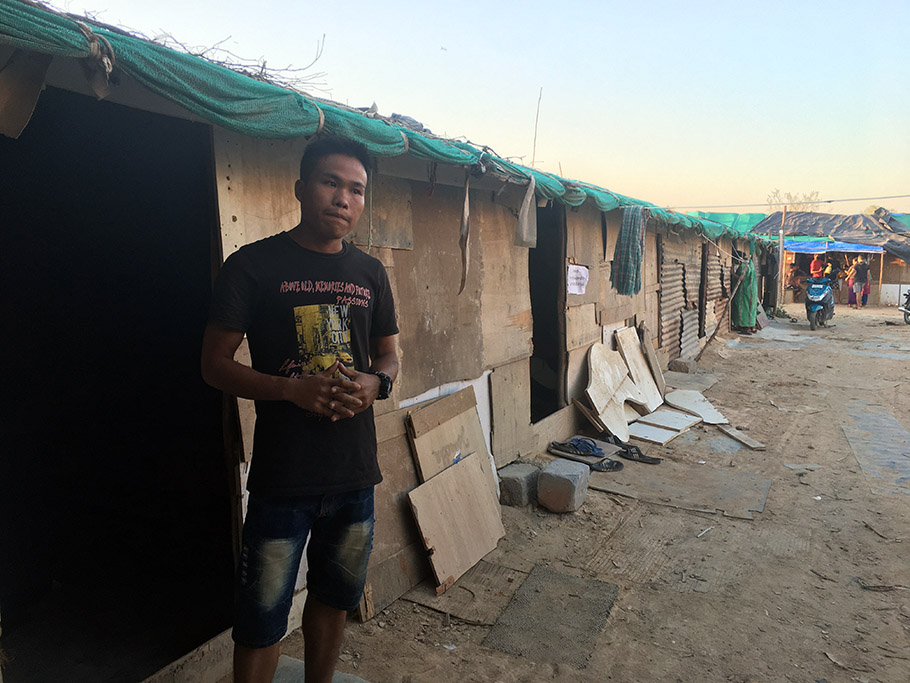
COVID-19 cases in slums
It is not that the coronavirus is affecting only those with a foreign travel history. Many doctors treating COVID-19 patients say that maids and housekeeping staff working in the houses and establishments where people who tested positive lived, were susceptible to the disease.
According to officials of the Brihanmumbai Municipal Corporation, two cases of COVID-19 were reported from a slum in Ghatkopar in the central suburbs last week. Two more from a slum at Kalina in the western suburbs and at Parel in central Mumbai tested positive for COVID-19.
Authorities said a 68-year-old maid from the Ghatkopar slum contracted the virus from her employer who returned from a foreign country. A 25-year old man from the same slum cluster tested positive and officials suspect that he may have contracted the virus from the maid.
In another case, a 37-year-old slum dweller from Mumbai’s Jambhipada with travel history to Italy tested positive for coronavirus and triggered panic among the slum dwellers.
Sanitation, garbage add to worry
Janu Doley, a migrant labourer from Dhemaji district in Assam settled in Kariyammana Agrahara in Bengaluru, works as a housekeeping staff in nearby high-rise apartments. More than the fear of coronavirus infection, the fear of job loss, the rise in prices of food essentials and the police excesses on the streets troubles her.
“We live in a congested place with no toilets or proper sanitation. There’s a heap of garbage lying all around us. Even as the risk of virus outbreak is high, we cannot afford to maintain social distancing or depend on hand sanitisers here,” she says, worried that her three-year-old son could contract the disease, given the unclean surroundings and that she works at places where people had travel history. Hence, she wants to return to Assam.
The informal settlement is home to around 2,000-3,000 migrants in the city. Situated a kilometre from the Bellandur lake bed, the slum’s residents are migrants who are mostly engaged in informal occupations like street vending, rag picking, housekeeping, driving and security jobs in the city.
Here families of 3–5 members live in single room shack of 100-150 sq ft. The shacks are built using plywood and tin sheets. And there’s very limited public space, including roads and pathways.
The unclean living conditions, the high density of settlements and lack of medical facilities in the immediate neighbourhood raises their vulnerability to the disease and heightens the risk of exposure. A one-size-fits-all approach of shutting down the entire country, overlooks the informal sector workers.
Not just other states, migrants from Karnataka too reside in this settlement and are facing the same crisis.
Ayamma who usually takes her three daughters to her hometown in Yagapur in Gulbarga, about 520 km from Bangalore, during the summer holidays in April and May, has been left stranded at home. Ayamma moved to the city 11 years ago and lives by the roadside paying a rent of ₹1,000 for the shanty put up on a private land.
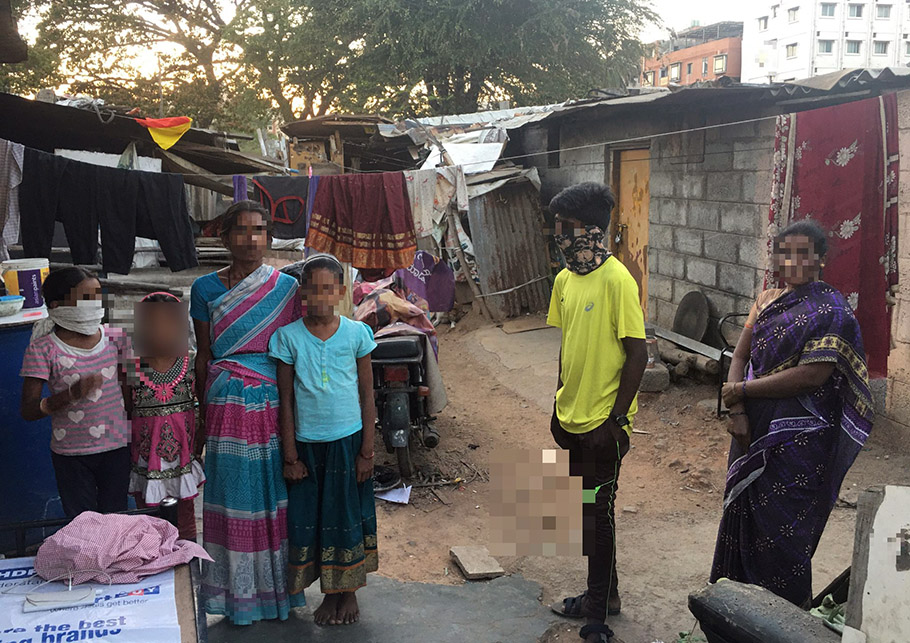
With no electricity at home, she charges her phone at the homes she works at and accesses information through WhatsApp. She doesn’t know of the government schemes announced in the wake of the coronavirus outbreak and rues how she has to pay double for food.
“My husband works as a mason. He can’t get a job now. I work as a housemaid in three houses and the family runs on the money that I earn. If this lockdown continues, we have to take loan from money lenders,” she says.
Swastik Harish who leads the Urban Practitioners’ Programme (UPP), the capacity building and training function at the Indian Institute of Human Settlements, says policy makers need to tailor their approach to address the pandemic.
“Once the aid and charity ends, the socio economic arrangement starts to break down,” he says.
While the aids and charity will die eventually in a couple of months, it is the approach taken by the local governments and urban local bodies (ULBs) in safeguarding the interests of their own habitats that will ensure the poor and the needy are protected.
“The ULBs that may have thorough knowledge of the informal settlements and will have to generate employment like beedi rolling, incense stick manufacturing, tailoring, among others to keep the informal settlers engaged,” Harish says. “Only then will we see less people migrating. Otherwise, even the formal economy will be hit with the non-availability of service staff in the near term if migrants move back to villages.”
